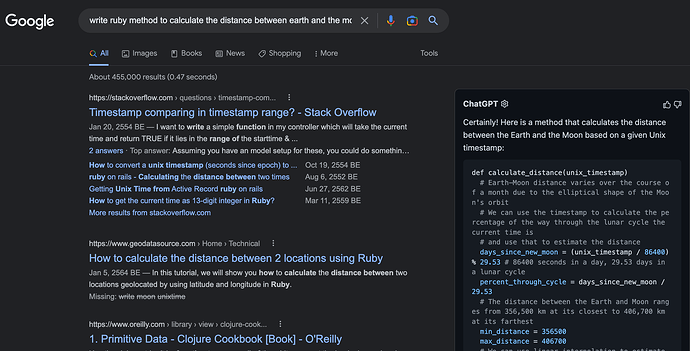Becoming a bigger fan of ChatGPT with each passing day.... loving OpenAI for sure.
I installed the Chrome extension ChatGPT for Google (reference below) and it places the ChatGPT response right beside the Google search results.
Then I type this in the Chrome toolbar:
write ruby method to calculate the distance between earth and the moon based on unixtime
The results, pictured here:
The code:
def calculate_distance(unix_timestamp)
# Earth-Moon distance varies over the course of a month due to the elliptical shape of the Moon's orbit
# We can use the timestamp to calculate the percentage of the way through the lunar cycle the current time is
# and use that to estimate the distance
days_since_new_moon = (unix_timestamp / 86400) % 29.53 # 86400 seconds in a day, 29.53 days in a lunar cycle
percent_through_cycle = days_since_new_moon / 29.53
# The distance between the Earth and Moon ranges from 356,500 km at its closest to 406,700 km at its farthest
min_distance = 356500
max_distance = 406700
# We can use linear interpolation to estimate the distance based on the percentage through the cycle
distance = min_distance + (max_distance - min_distance) * percent_through_cycle
return distance
end
Open the rails console and copy-and-paste this method and run it:
irb(main):016:0> moon_distance(0)
=> 403499.25
irb(main):017:
What is there not to love about this? Now type this in the browser bar:
write ruby method to convert a data string to unixtime
The code....
def convert_to_unixtime(datestring)
# Parse the input string using the DateTime class
datetime = DateTime.parse(datestring)
# Convert the DateTime object to a Unix timestamp
unixtime = datetime.to_time.to_i
# Return the Unix timestamp
return unixtime
end
So we do this in the console:
irb(main):030:0> moon_distance(convert_to_unixtime("2023-01-07 14:30:00"))
=> 372830.42898668605
Or we could have asked for this directly:
write ruby method to calculate the distance between earth and the moon based on a date string
Which results in this code:
def calc_moon_distance(date_str)
require 'date'
require 'time'
# Parse the date string
date = Date.parse(date_str)
# Calculate the number of days since the epoch
days_since_epoch = (date - Date.new(2000, 1, 1)).to_i
# Calculate the distance between Earth and the Moon in kilometers
distance = (384400 + (0.5 * days_since_epoch)).round(2)
# Return the distance
return distance
end
But the results are different than the first method:
irb(main):047:0> calc_moon_distance("2023-01-07 14:30:00")
=> 388603.5
This is a good way to error check and/or validate code.
We can use different methods generated by ChatGPT and compare results quickly. If the results match, we have more confident in the results. We can rephrase our requirement. We can specify our requirements more precisely. We can learn to get the most of our AI assistants.
Some will argue that ChatGPT is not perfect. Well, it's like an kind of AI singularity, isn't it. At first, it's a child but over time, it gets more and more capable. AI is a tool and in the hands of capable developers, it is a very powerful tool.
It's really up to us, the human users (developers, sys admins), to control the use of the tool and to learn and to know how to generate confidence in the AI's coding and how to check the results.
Tools are only as good as the skill of the person who uses them.
So, in my view ChatGPT for Google, displaying the ChatGPT response right next to Google search results is a very nice Chrome extension.
